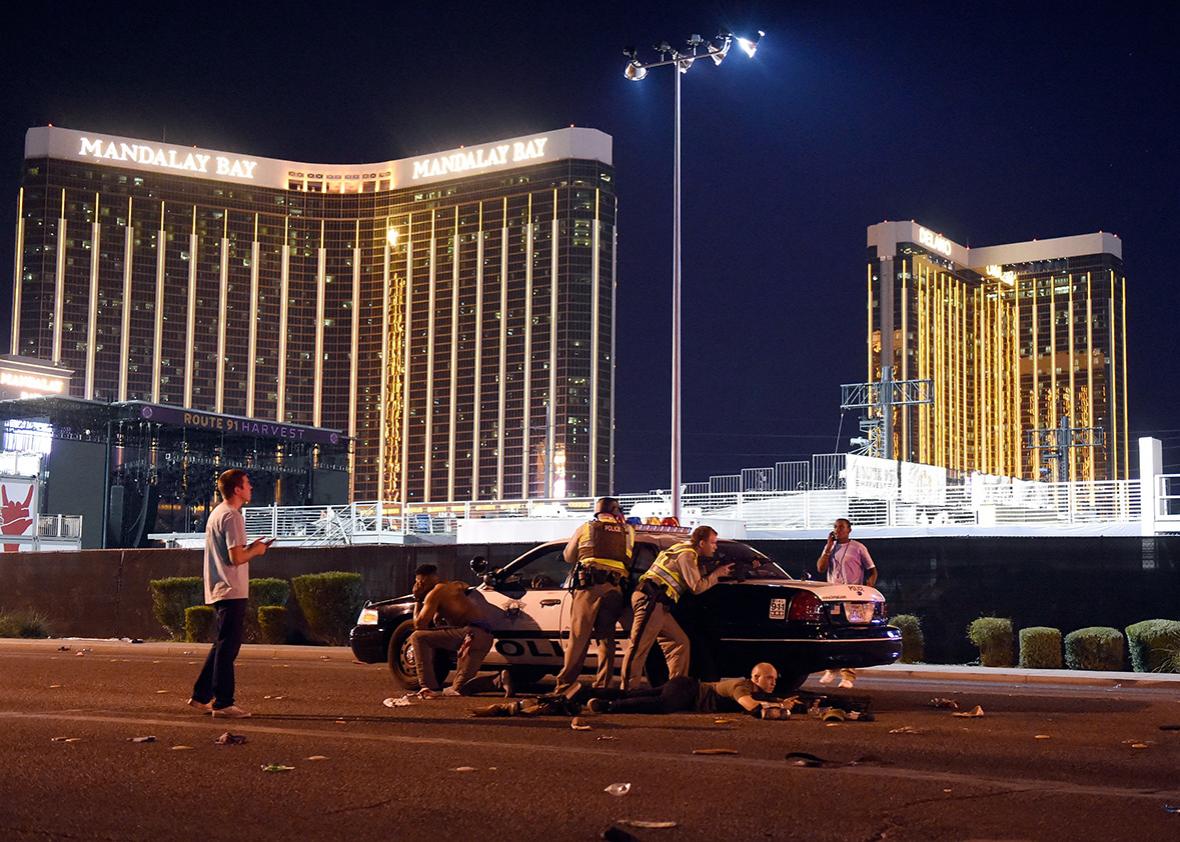Implicit in all political coverage by the media is the belief that political actors matter. That what they say and do shapes the larger landscape of democratic life, and that it needs to be explained, analyzed, and contextualized. But that belief is challenged by mass shootings like the one Sunday night in Las Vegas that has so far claimed 59 lives and left hundreds more injured. Not because these shootings aren’t political events—they’re saturated with politics—but because they’re politically inert.
Yes, there are rituals that come with every shooting. Politicians express their condolences, sending “thoughts and prayers” to affected families and communities. Reporters profile victims and survivors, adding texture to our understanding of the tragedy. The bulk of the attention is paid to the shooters: their histories, their identities, their motives. If the gunman is white, he (and it is almost always a “he”) is allowed a degree of nuance: He’s depicted as a human being, albeit a monstrous one. If the gunman is not—if he’s Muslim, for example—then the conversation switches gears to “terrorism” and “radicalization” with all the associated tropes. At one point or another, the president speaks and offers comfort to a stunned public.
“In times such as these, I know we are searching for some kind of meaning in the chaos, some kind of light in the darkness,” said President Trump on Monday morning, hewing to his part in the script and meeting the low bar set for politicians in these moments. “The answers do not come easy. But we can take solace knowing that even the darkest space can be brightened by a single light, and even the most terrible despair can be illuminated by a single ray of hope.”
Trump’s statement is a familiar beat. But with that last sentence—in that last word, hope—he unintentionally shows the hollowness of this exercise. Hope is not an idle feeling. One hopes for something and here, presumably, one hopes for action to end the violence—for a country where we can inhabit public space without the specter of mass killing. A country where children don’t need to learn the phrase “active shooter,” and where we can walk into theaters, classrooms, and places of worship without making mental note of exits, should the all too thinkable happen.
But we know this particular hope means little, that action to prevent gun violence is far from forthcoming. If it didn’t happen after Sandy Hook—where a gunman killed 20 children—or the Pulse nightclub shooting in Orlando—where 49 victims lost their lives—then it isn’t happening after Las Vegas. Which gets to the truth of the matter. In America, after a mass shooting, we pantomime politics, but we don’t actually carry it out. Political leaders speak—they play their parts—but with no expectation of change. And for those of us who chronicle political action, it means we describe statements and rhetoric that ultimately amount to little, putting lie to the belief that there’s any meaning in what those actors say.
Perhaps this is too bleak. Perhaps it is unfair. After all, it’s too much to say that American society is paralyzed in the face of mass shootings. There are people fighting to change the landscape, to make it more responsive to a public that supports gun regulation and other measures which may shrink the odds of another Sandy Hook or another Las Vegas. That is politics. There are also institutions and organizations fighting to loosen what gun laws we have. That, too, is politics. Those actors, Republican politicians and gun lobbyists, matter.
A better way to describe the situation might be that we’re past the ability of mainstream politics to do anything about this status quo. As long as the Republican Party is fully committed to its vision of an armed society—a ruling party gripped by the power of the gun lobby and unmoved by the routine massacres that mark American life—there are few options in the realm of legislation.
Until someone, or something, can break that grip, we won’t actually have a national response to mass shootings. Instead, we’ll have this kabuki play, performed at every tragedy until the outrage fades and gun violence returns to the background of American life, destroying lives but not quite shocking the collective conscience. Until, of course, we’re met with another Sandy Hook, another Orlando, another Las Vegas.
